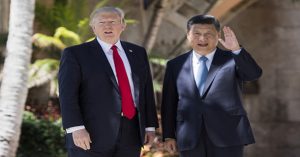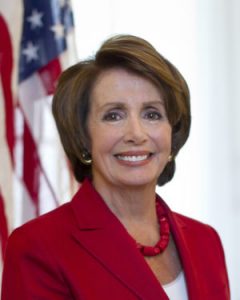
Photo: Jim Watson/AFP/Getty Images
United States President Donald Trump entertained his Chinese counterpart Xi Jinping at his private Mar-a-Lago residence in Florida over the weekend of April 8 and 9. The meeting was the first bilateral summit between the two powers since Trump’s election in November last year and it was a hotly anticipated affair. Prior to the meeting, long time Tibet supporter and Minority Leader of the United States House of Representatives, Nancy Pelosi, asked Trump to raise the human rights issue with Xi. She said human rights should be an integral element of dealing with the Chinese and that their actions in Tibet “challenge the conscience of the world”. US Senators Ben Cardin and Marco Rubio also wrote to US Secretary of State Rex Tillerson urging him to “make human rights a top priority” in the discussions. Making specific reference to Tibet, they wrote “we hope you will urge China to do more to improve the cultural and spiritual plight of Tibetans”.
Trump repeatedly labeled China a currency manipulator on the campaign trail and raised the prospect of a trade war if he was elected; his campaign manifesto even described China as an enemy of the United States. Following his election victory, Trump befuddled the Chinese by accepting a congratulatory call from the leader of Taiwan. Furthermore, Trump’s frequent criticism of the One China policy on the campaign trail and as President gave rise to hopes within the Central Tibetan Administration that he would adopt a bold and antagonistic approach with the Chinese that could shake the Tibetan situation from its current stagnation.

House Democratic Leader Nancy Pelosi
Given the tension filled preamble to Xi’s arrival at the so called “Winter Whitehouse”, the affair itself was quite cordial. In the lead up to the meeting Trump backed away from threats to challenge China over Taiwan, and his campaign promise to label China a currency manipulator “on day one”seems to have been forgotten. Speaking to the media about the meeting Rex Tillerson said that “both the atmosphere and the chemistry between the two leaders were positive”. Trump and Xi reportedly held “frank” and “very positive” discussions on issues ranging from North Korea, cyber security, trade and the situation in the South China Sea. Asked whether the question of human rights was raised Tillerson responded obliquely, saying such concerns had been “really embedded in every discussion”. At the end of the summit, Trump agreed to an invitation from Xi to attend a state visit to China at an unspecified time later this year. There were no press reports during or following the summit which suggested that the issue of Tibet had been discussed directly at all.
In March, the Chinese released their own report detailing human rights abuses in the United States. The report criticised the US for having the second highest incarceration rate in the world and for the over 58,000 incidents of gun violence which occurred there in 2016. It said the US poses as “the judge of human rights” but “exposed its human rights ‘myth’ with its own deeds”.




 Print
Print Email
Email